Psychosocial Case Study: John's Challenges and Intervention Strategies
VerifiedAdded on 2022/11/11
|8
|2335
|167
Case Study
AI Summary
This case study analyzes the psychosocial issues of an 18-year-old named John, who is experiencing depression following a breakup. The report examines his challenges, including withdrawal from academics and social activities, and his reluctance to seek help. It identifies the informal support provided by his mother and highlights the need for professional intervention through GPs and potential psychiatric consultations. The study explores gaps in service delivery, emphasizing the need for improved communication and understanding. It advocates for a strength-based and person-centered approach, emphasizing the importance of therapeutic assistance, self-determination, and a referral plan that includes psychological consultation and strong support from family and medical professionals. The analysis emphasizes the need for a comprehensive approach to address John's mental health needs, including medication and therapy, and offers a detailed reference list supporting the analysis.

CASE STUDY ANALYSIS REPORT
CASE STUDY 01
CASE STUDY 01
Paraphrase This Document
Need a fresh take? Get an instant paraphrase of this document with our AI Paraphraser
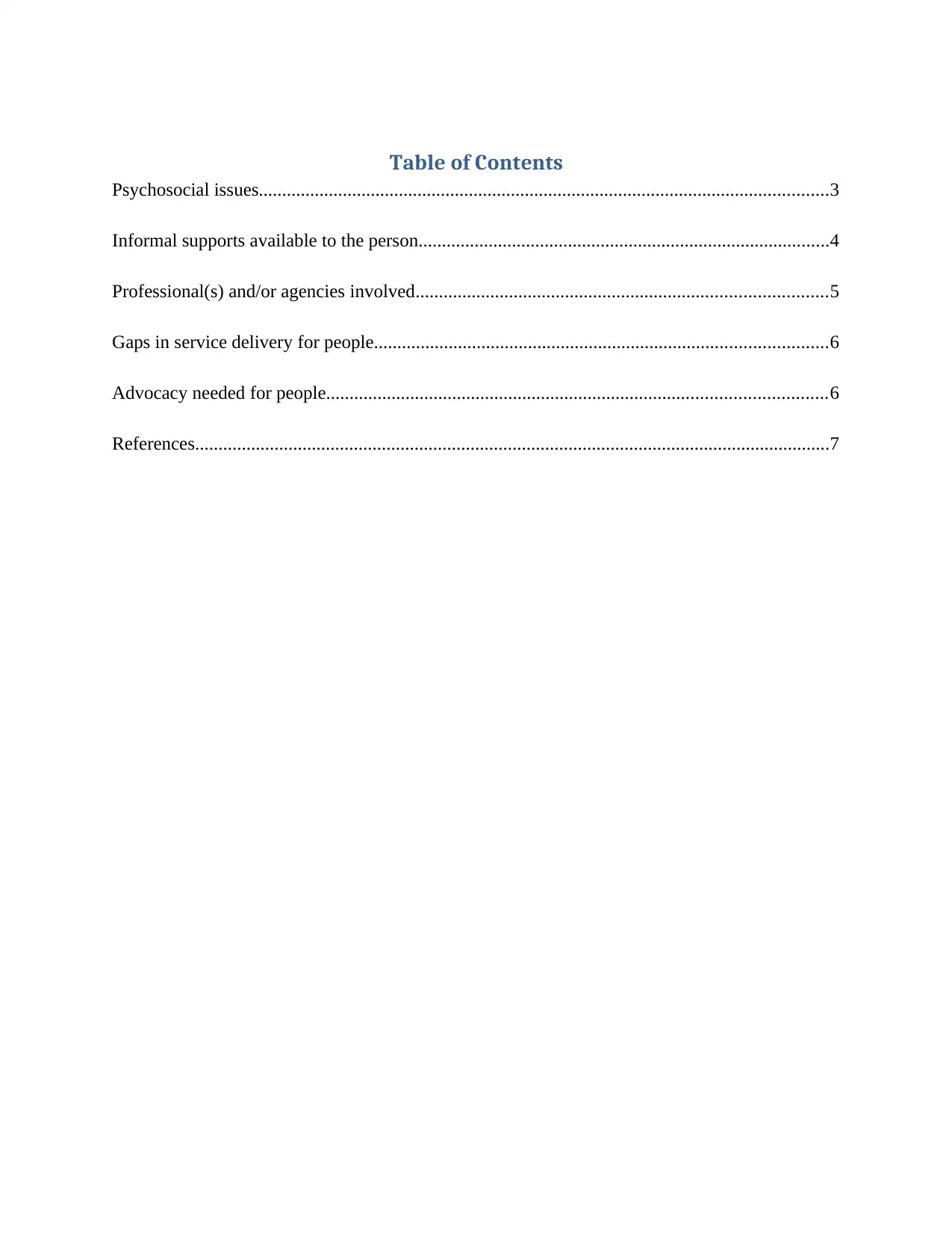
Table of Contents
Psychosocial issues..........................................................................................................................3
Informal supports available to the person........................................................................................4
Professional(s) and/or agencies involved........................................................................................5
Gaps in service delivery for people.................................................................................................6
Advocacy needed for people...........................................................................................................6
References........................................................................................................................................7
Psychosocial issues..........................................................................................................................3
Informal supports available to the person........................................................................................4
Professional(s) and/or agencies involved........................................................................................5
Gaps in service delivery for people.................................................................................................6
Advocacy needed for people...........................................................................................................6
References........................................................................................................................................7
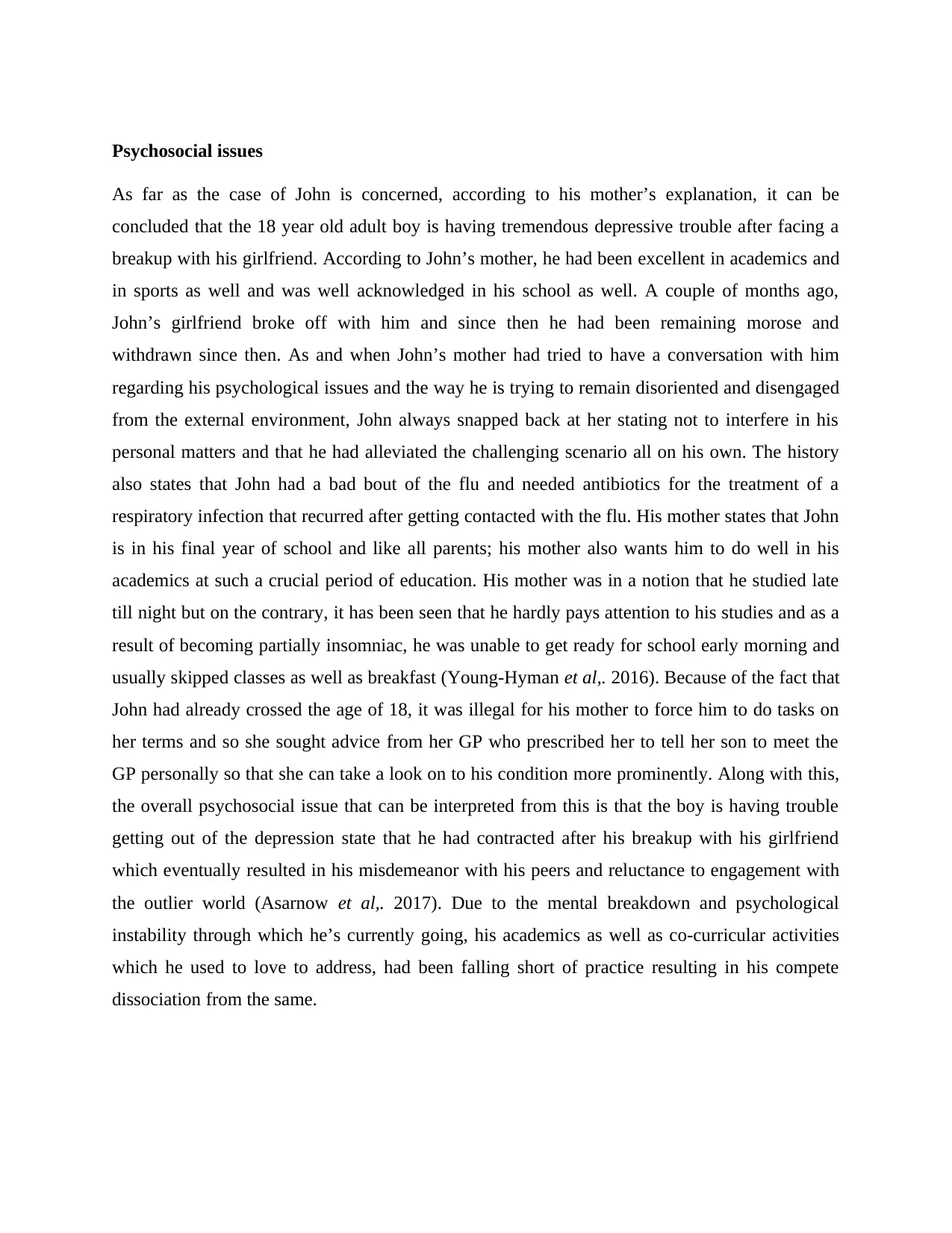
Psychosocial issues
As far as the case of John is concerned, according to his mother’s explanation, it can be
concluded that the 18 year old adult boy is having tremendous depressive trouble after facing a
breakup with his girlfriend. According to John’s mother, he had been excellent in academics and
in sports as well and was well acknowledged in his school as well. A couple of months ago,
John’s girlfriend broke off with him and since then he had been remaining morose and
withdrawn since then. As and when John’s mother had tried to have a conversation with him
regarding his psychological issues and the way he is trying to remain disoriented and disengaged
from the external environment, John always snapped back at her stating not to interfere in his
personal matters and that he had alleviated the challenging scenario all on his own. The history
also states that John had a bad bout of the flu and needed antibiotics for the treatment of a
respiratory infection that recurred after getting contacted with the flu. His mother states that John
is in his final year of school and like all parents; his mother also wants him to do well in his
academics at such a crucial period of education. His mother was in a notion that he studied late
till night but on the contrary, it has been seen that he hardly pays attention to his studies and as a
result of becoming partially insomniac, he was unable to get ready for school early morning and
usually skipped classes as well as breakfast (Young-Hyman et al,. 2016). Because of the fact that
John had already crossed the age of 18, it was illegal for his mother to force him to do tasks on
her terms and so she sought advice from her GP who prescribed her to tell her son to meet the
GP personally so that she can take a look on to his condition more prominently. Along with this,
the overall psychosocial issue that can be interpreted from this is that the boy is having trouble
getting out of the depression state that he had contracted after his breakup with his girlfriend
which eventually resulted in his misdemeanor with his peers and reluctance to engagement with
the outlier world (Asarnow et al,. 2017). Due to the mental breakdown and psychological
instability through which he’s currently going, his academics as well as co-curricular activities
which he used to love to address, had been falling short of practice resulting in his compete
dissociation from the same.
As far as the case of John is concerned, according to his mother’s explanation, it can be
concluded that the 18 year old adult boy is having tremendous depressive trouble after facing a
breakup with his girlfriend. According to John’s mother, he had been excellent in academics and
in sports as well and was well acknowledged in his school as well. A couple of months ago,
John’s girlfriend broke off with him and since then he had been remaining morose and
withdrawn since then. As and when John’s mother had tried to have a conversation with him
regarding his psychological issues and the way he is trying to remain disoriented and disengaged
from the external environment, John always snapped back at her stating not to interfere in his
personal matters and that he had alleviated the challenging scenario all on his own. The history
also states that John had a bad bout of the flu and needed antibiotics for the treatment of a
respiratory infection that recurred after getting contacted with the flu. His mother states that John
is in his final year of school and like all parents; his mother also wants him to do well in his
academics at such a crucial period of education. His mother was in a notion that he studied late
till night but on the contrary, it has been seen that he hardly pays attention to his studies and as a
result of becoming partially insomniac, he was unable to get ready for school early morning and
usually skipped classes as well as breakfast (Young-Hyman et al,. 2016). Because of the fact that
John had already crossed the age of 18, it was illegal for his mother to force him to do tasks on
her terms and so she sought advice from her GP who prescribed her to tell her son to meet the
GP personally so that she can take a look on to his condition more prominently. Along with this,
the overall psychosocial issue that can be interpreted from this is that the boy is having trouble
getting out of the depression state that he had contracted after his breakup with his girlfriend
which eventually resulted in his misdemeanor with his peers and reluctance to engagement with
the outlier world (Asarnow et al,. 2017). Due to the mental breakdown and psychological
instability through which he’s currently going, his academics as well as co-curricular activities
which he used to love to address, had been falling short of practice resulting in his compete
dissociation from the same.
⊘ This is a preview!⊘
Do you want full access?
Subscribe today to unlock all pages.

Trusted by 1+ million students worldwide
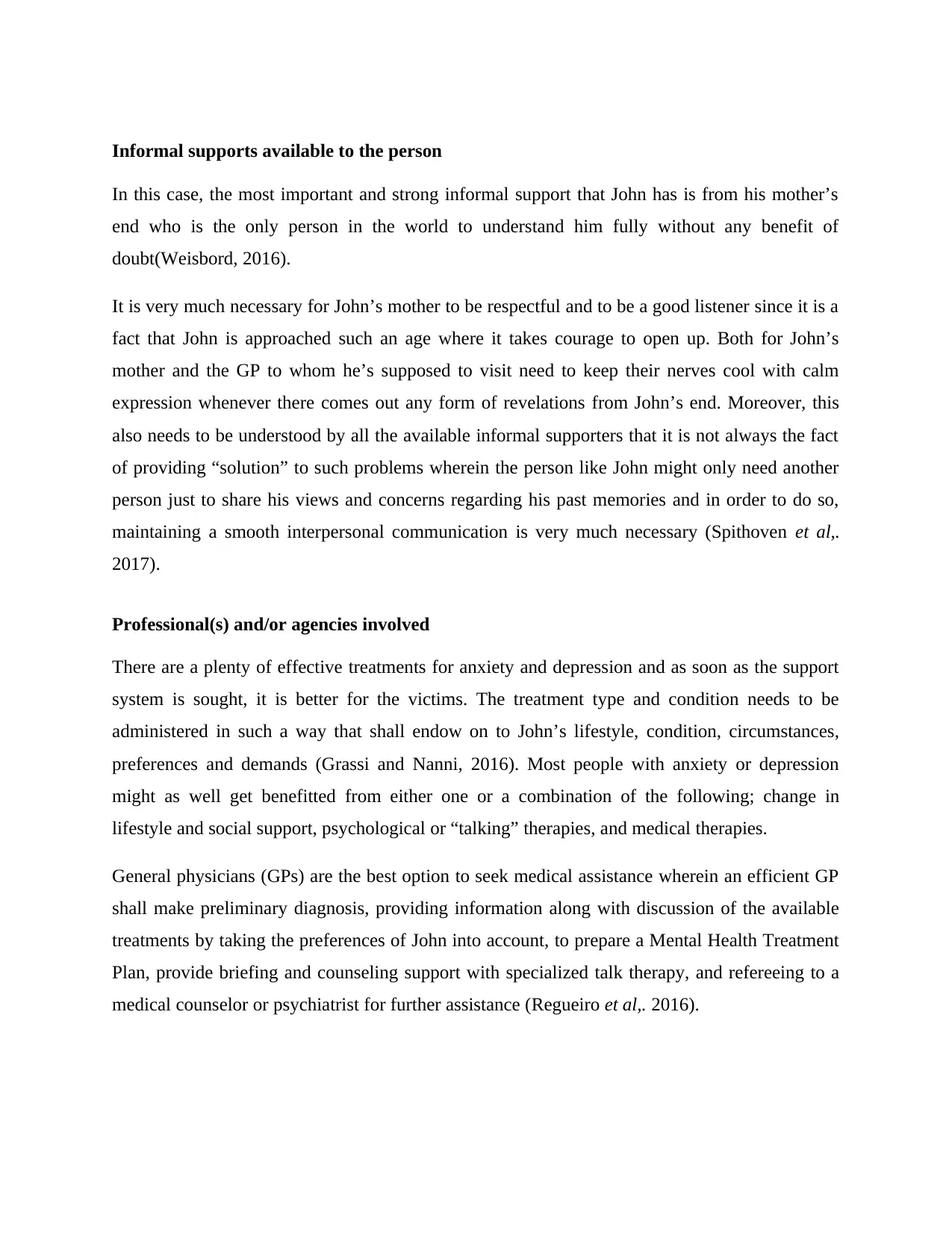
Informal supports available to the person
In this case, the most important and strong informal support that John has is from his mother’s
end who is the only person in the world to understand him fully without any benefit of
doubt(Weisbord, 2016).
It is very much necessary for John’s mother to be respectful and to be a good listener since it is a
fact that John is approached such an age where it takes courage to open up. Both for John’s
mother and the GP to whom he’s supposed to visit need to keep their nerves cool with calm
expression whenever there comes out any form of revelations from John’s end. Moreover, this
also needs to be understood by all the available informal supporters that it is not always the fact
of providing “solution” to such problems wherein the person like John might only need another
person just to share his views and concerns regarding his past memories and in order to do so,
maintaining a smooth interpersonal communication is very much necessary (Spithoven et al,.
2017).
Professional(s) and/or agencies involved
There are a plenty of effective treatments for anxiety and depression and as soon as the support
system is sought, it is better for the victims. The treatment type and condition needs to be
administered in such a way that shall endow on to John’s lifestyle, condition, circumstances,
preferences and demands (Grassi and Nanni, 2016). Most people with anxiety or depression
might as well get benefitted from either one or a combination of the following; change in
lifestyle and social support, psychological or “talking” therapies, and medical therapies.
General physicians (GPs) are the best option to seek medical assistance wherein an efficient GP
shall make preliminary diagnosis, providing information along with discussion of the available
treatments by taking the preferences of John into account, to prepare a Mental Health Treatment
Plan, provide briefing and counseling support with specialized talk therapy, and refereeing to a
medical counselor or psychiatrist for further assistance (Regueiro et al,. 2016).
In this case, the most important and strong informal support that John has is from his mother’s
end who is the only person in the world to understand him fully without any benefit of
doubt(Weisbord, 2016).
It is very much necessary for John’s mother to be respectful and to be a good listener since it is a
fact that John is approached such an age where it takes courage to open up. Both for John’s
mother and the GP to whom he’s supposed to visit need to keep their nerves cool with calm
expression whenever there comes out any form of revelations from John’s end. Moreover, this
also needs to be understood by all the available informal supporters that it is not always the fact
of providing “solution” to such problems wherein the person like John might only need another
person just to share his views and concerns regarding his past memories and in order to do so,
maintaining a smooth interpersonal communication is very much necessary (Spithoven et al,.
2017).
Professional(s) and/or agencies involved
There are a plenty of effective treatments for anxiety and depression and as soon as the support
system is sought, it is better for the victims. The treatment type and condition needs to be
administered in such a way that shall endow on to John’s lifestyle, condition, circumstances,
preferences and demands (Grassi and Nanni, 2016). Most people with anxiety or depression
might as well get benefitted from either one or a combination of the following; change in
lifestyle and social support, psychological or “talking” therapies, and medical therapies.
General physicians (GPs) are the best option to seek medical assistance wherein an efficient GP
shall make preliminary diagnosis, providing information along with discussion of the available
treatments by taking the preferences of John into account, to prepare a Mental Health Treatment
Plan, provide briefing and counseling support with specialized talk therapy, and refereeing to a
medical counselor or psychiatrist for further assistance (Regueiro et al,. 2016).
Paraphrase This Document
Need a fresh take? Get an instant paraphrase of this document with our AI Paraphraser
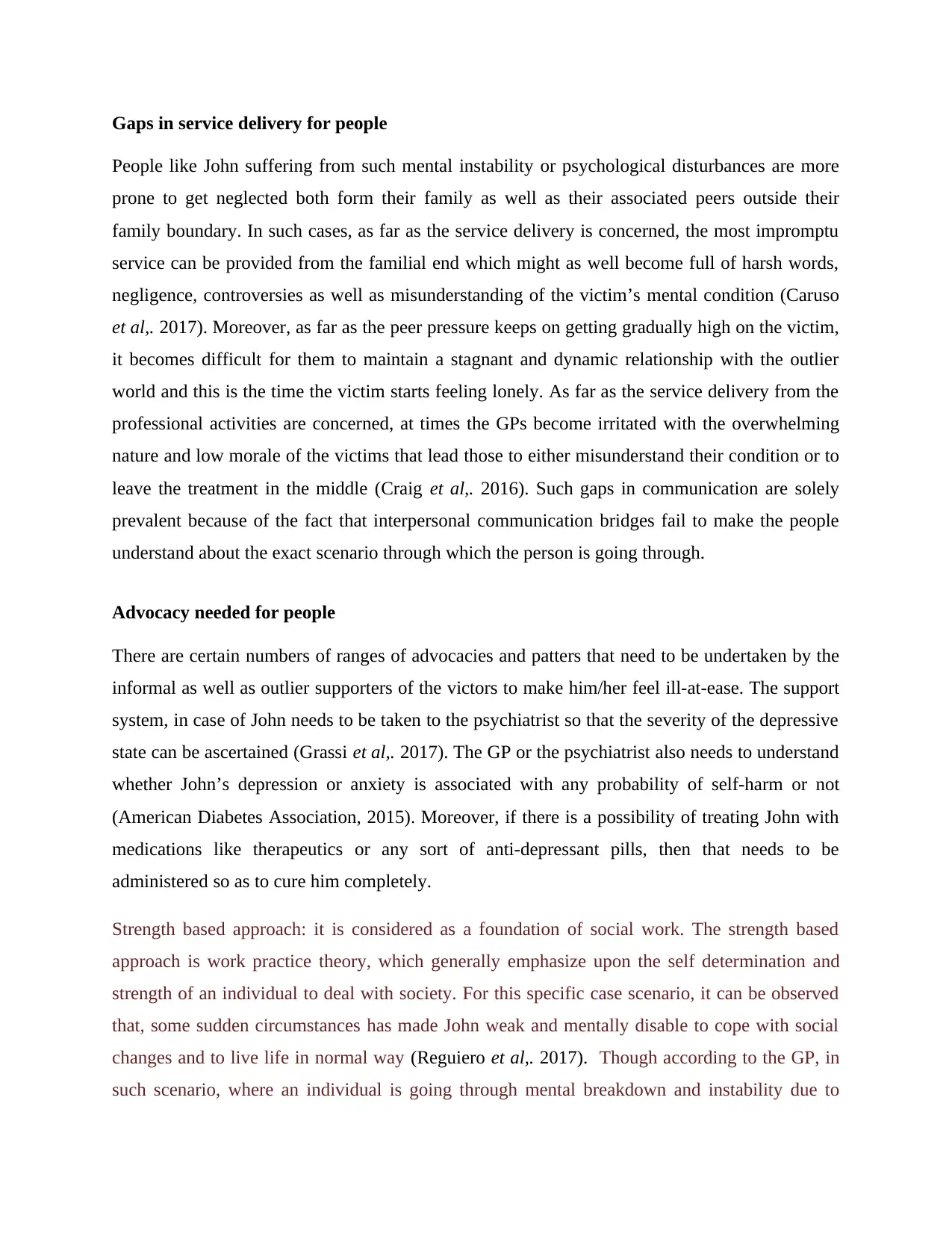
Gaps in service delivery for people
People like John suffering from such mental instability or psychological disturbances are more
prone to get neglected both form their family as well as their associated peers outside their
family boundary. In such cases, as far as the service delivery is concerned, the most impromptu
service can be provided from the familial end which might as well become full of harsh words,
negligence, controversies as well as misunderstanding of the victim’s mental condition (Caruso
et al,. 2017). Moreover, as far as the peer pressure keeps on getting gradually high on the victim,
it becomes difficult for them to maintain a stagnant and dynamic relationship with the outlier
world and this is the time the victim starts feeling lonely. As far as the service delivery from the
professional activities are concerned, at times the GPs become irritated with the overwhelming
nature and low morale of the victims that lead those to either misunderstand their condition or to
leave the treatment in the middle (Craig et al,. 2016). Such gaps in communication are solely
prevalent because of the fact that interpersonal communication bridges fail to make the people
understand about the exact scenario through which the person is going through.
Advocacy needed for people
There are certain numbers of ranges of advocacies and patters that need to be undertaken by the
informal as well as outlier supporters of the victors to make him/her feel ill-at-ease. The support
system, in case of John needs to be taken to the psychiatrist so that the severity of the depressive
state can be ascertained (Grassi et al,. 2017). The GP or the psychiatrist also needs to understand
whether John’s depression or anxiety is associated with any probability of self-harm or not
(American Diabetes Association, 2015). Moreover, if there is a possibility of treating John with
medications like therapeutics or any sort of anti-depressant pills, then that needs to be
administered so as to cure him completely.
Strength based approach: it is considered as a foundation of social work. The strength based
approach is work practice theory, which generally emphasize upon the self determination and
strength of an individual to deal with society. For this specific case scenario, it can be observed
that, some sudden circumstances has made John weak and mentally disable to cope with social
changes and to live life in normal way (Reguiero et al,. 2017). Though according to the GP, in
such scenario, where an individual is going through mental breakdown and instability due to
People like John suffering from such mental instability or psychological disturbances are more
prone to get neglected both form their family as well as their associated peers outside their
family boundary. In such cases, as far as the service delivery is concerned, the most impromptu
service can be provided from the familial end which might as well become full of harsh words,
negligence, controversies as well as misunderstanding of the victim’s mental condition (Caruso
et al,. 2017). Moreover, as far as the peer pressure keeps on getting gradually high on the victim,
it becomes difficult for them to maintain a stagnant and dynamic relationship with the outlier
world and this is the time the victim starts feeling lonely. As far as the service delivery from the
professional activities are concerned, at times the GPs become irritated with the overwhelming
nature and low morale of the victims that lead those to either misunderstand their condition or to
leave the treatment in the middle (Craig et al,. 2016). Such gaps in communication are solely
prevalent because of the fact that interpersonal communication bridges fail to make the people
understand about the exact scenario through which the person is going through.
Advocacy needed for people
There are certain numbers of ranges of advocacies and patters that need to be undertaken by the
informal as well as outlier supporters of the victors to make him/her feel ill-at-ease. The support
system, in case of John needs to be taken to the psychiatrist so that the severity of the depressive
state can be ascertained (Grassi et al,. 2017). The GP or the psychiatrist also needs to understand
whether John’s depression or anxiety is associated with any probability of self-harm or not
(American Diabetes Association, 2015). Moreover, if there is a possibility of treating John with
medications like therapeutics or any sort of anti-depressant pills, then that needs to be
administered so as to cure him completely.
Strength based approach: it is considered as a foundation of social work. The strength based
approach is work practice theory, which generally emphasize upon the self determination and
strength of an individual to deal with society. For this specific case scenario, it can be observed
that, some sudden circumstances has made John weak and mentally disable to cope with social
changes and to live life in normal way (Reguiero et al,. 2017). Though according to the GP, in
such scenario, where an individual is going through mental breakdown and instability due to
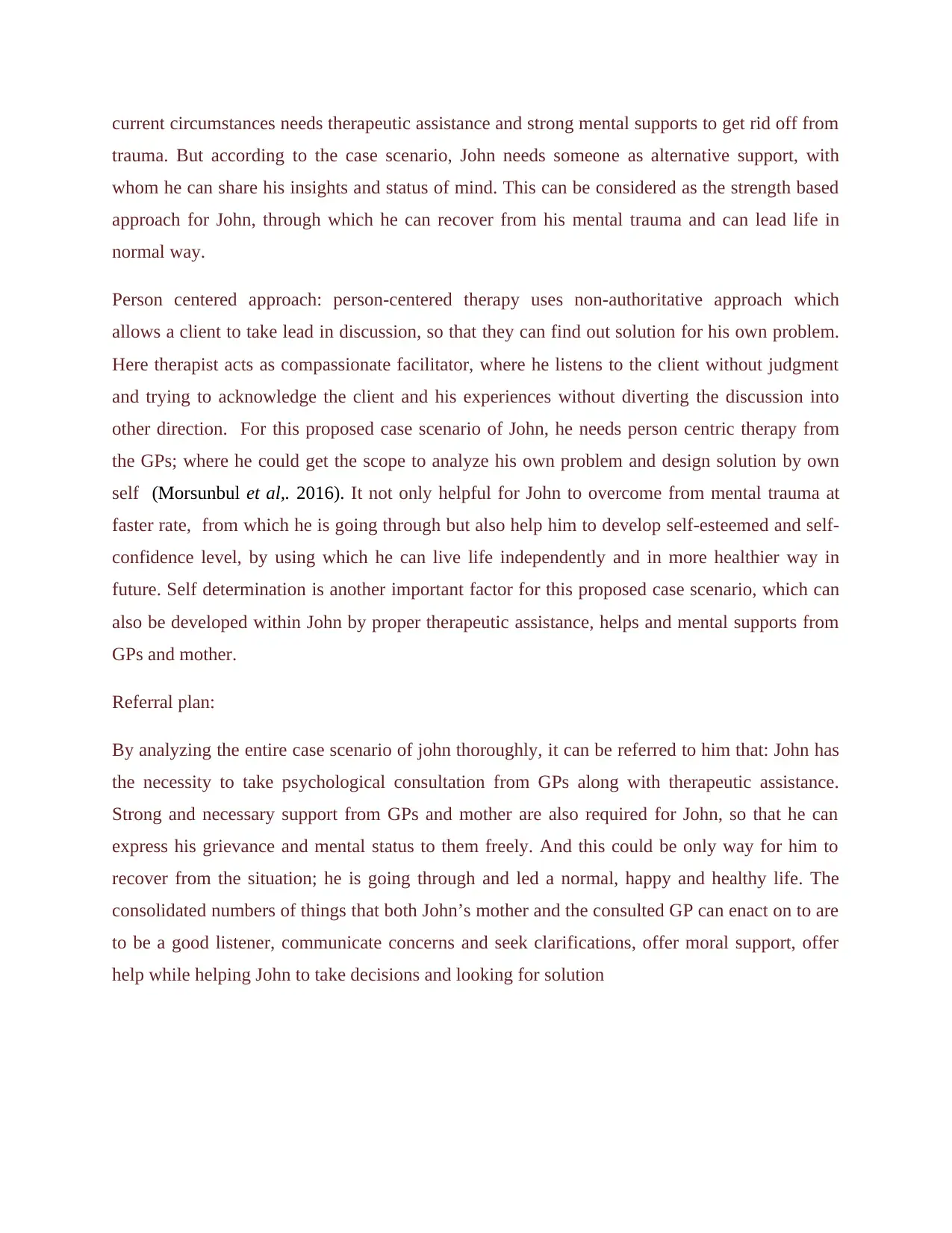
current circumstances needs therapeutic assistance and strong mental supports to get rid off from
trauma. But according to the case scenario, John needs someone as alternative support, with
whom he can share his insights and status of mind. This can be considered as the strength based
approach for John, through which he can recover from his mental trauma and can lead life in
normal way.
Person centered approach: person-centered therapy uses non-authoritative approach which
allows a client to take lead in discussion, so that they can find out solution for his own problem.
Here therapist acts as compassionate facilitator, where he listens to the client without judgment
and trying to acknowledge the client and his experiences without diverting the discussion into
other direction. For this proposed case scenario of John, he needs person centric therapy from
the GPs; where he could get the scope to analyze his own problem and design solution by own
self (Morsunbul et al,. 2016). It not only helpful for John to overcome from mental trauma at
faster rate, from which he is going through but also help him to develop self-esteemed and self-
confidence level, by using which he can live life independently and in more healthier way in
future. Self determination is another important factor for this proposed case scenario, which can
also be developed within John by proper therapeutic assistance, helps and mental supports from
GPs and mother.
Referral plan:
By analyzing the entire case scenario of john thoroughly, it can be referred to him that: John has
the necessity to take psychological consultation from GPs along with therapeutic assistance.
Strong and necessary support from GPs and mother are also required for John, so that he can
express his grievance and mental status to them freely. And this could be only way for him to
recover from the situation; he is going through and led a normal, happy and healthy life. The
consolidated numbers of things that both John’s mother and the consulted GP can enact on to are
to be a good listener, communicate concerns and seek clarifications, offer moral support, offer
help while helping John to take decisions and looking for solution
trauma. But according to the case scenario, John needs someone as alternative support, with
whom he can share his insights and status of mind. This can be considered as the strength based
approach for John, through which he can recover from his mental trauma and can lead life in
normal way.
Person centered approach: person-centered therapy uses non-authoritative approach which
allows a client to take lead in discussion, so that they can find out solution for his own problem.
Here therapist acts as compassionate facilitator, where he listens to the client without judgment
and trying to acknowledge the client and his experiences without diverting the discussion into
other direction. For this proposed case scenario of John, he needs person centric therapy from
the GPs; where he could get the scope to analyze his own problem and design solution by own
self (Morsunbul et al,. 2016). It not only helpful for John to overcome from mental trauma at
faster rate, from which he is going through but also help him to develop self-esteemed and self-
confidence level, by using which he can live life independently and in more healthier way in
future. Self determination is another important factor for this proposed case scenario, which can
also be developed within John by proper therapeutic assistance, helps and mental supports from
GPs and mother.
Referral plan:
By analyzing the entire case scenario of john thoroughly, it can be referred to him that: John has
the necessity to take psychological consultation from GPs along with therapeutic assistance.
Strong and necessary support from GPs and mother are also required for John, so that he can
express his grievance and mental status to them freely. And this could be only way for him to
recover from the situation; he is going through and led a normal, happy and healthy life. The
consolidated numbers of things that both John’s mother and the consulted GP can enact on to are
to be a good listener, communicate concerns and seek clarifications, offer moral support, offer
help while helping John to take decisions and looking for solution
⊘ This is a preview!⊘
Do you want full access?
Subscribe today to unlock all pages.

Trusted by 1+ million students worldwide
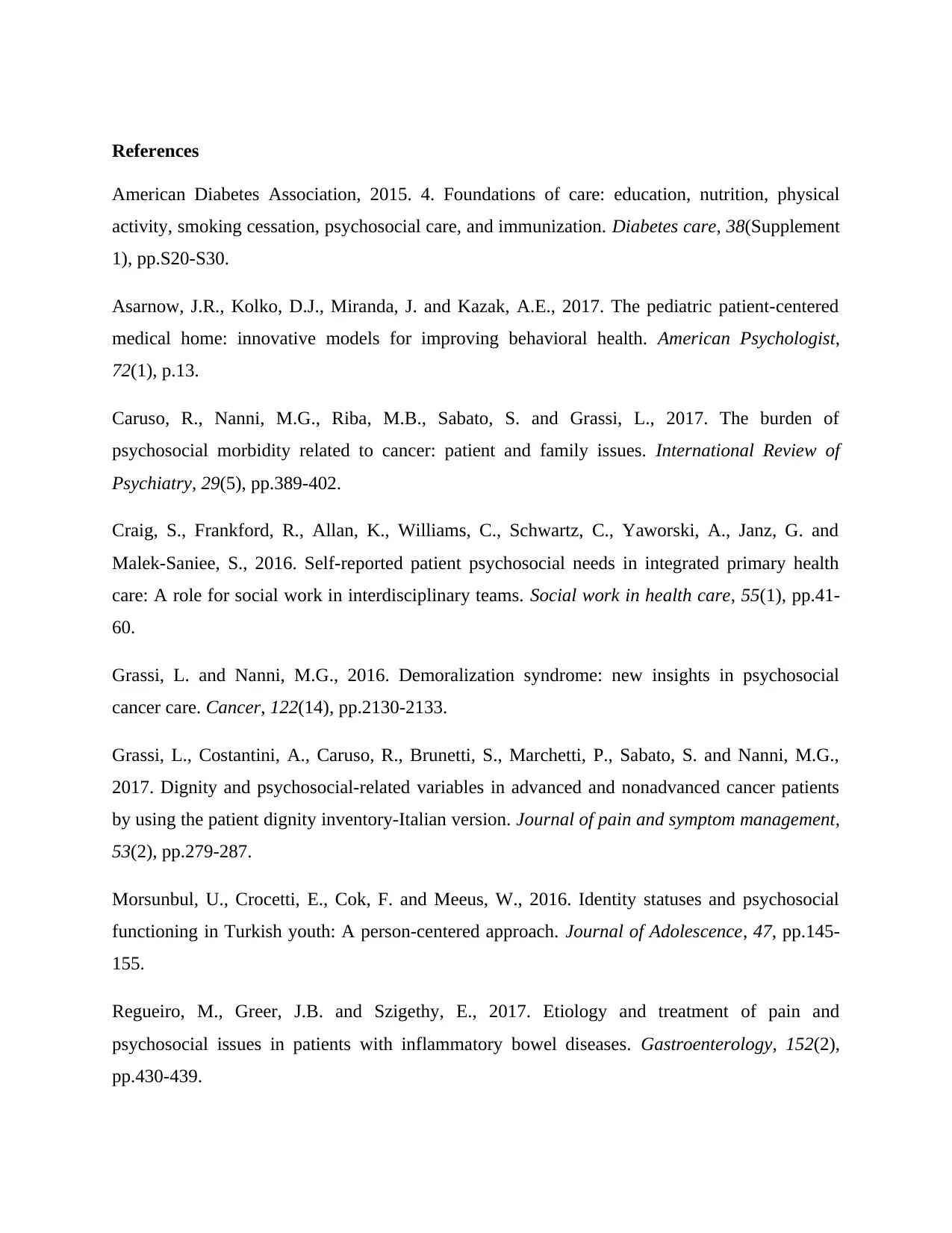
References
American Diabetes Association, 2015. 4. Foundations of care: education, nutrition, physical
activity, smoking cessation, psychosocial care, and immunization. Diabetes care, 38(Supplement
1), pp.S20-S30.
Asarnow, J.R., Kolko, D.J., Miranda, J. and Kazak, A.E., 2017. The pediatric patient-centered
medical home: innovative models for improving behavioral health. American Psychologist,
72(1), p.13.
Caruso, R., Nanni, M.G., Riba, M.B., Sabato, S. and Grassi, L., 2017. The burden of
psychosocial morbidity related to cancer: patient and family issues. International Review of
Psychiatry, 29(5), pp.389-402.
Craig, S., Frankford, R., Allan, K., Williams, C., Schwartz, C., Yaworski, A., Janz, G. and
Malek-Saniee, S., 2016. Self-reported patient psychosocial needs in integrated primary health
care: A role for social work in interdisciplinary teams. Social work in health care, 55(1), pp.41-
60.
Grassi, L. and Nanni, M.G., 2016. Demoralization syndrome: new insights in psychosocial
cancer care. Cancer, 122(14), pp.2130-2133.
Grassi, L., Costantini, A., Caruso, R., Brunetti, S., Marchetti, P., Sabato, S. and Nanni, M.G.,
2017. Dignity and psychosocial-related variables in advanced and nonadvanced cancer patients
by using the patient dignity inventory-Italian version. Journal of pain and symptom management,
53(2), pp.279-287.
Morsunbul, U., Crocetti, E., Cok, F. and Meeus, W., 2016. Identity statuses and psychosocial
functioning in Turkish youth: A person-centered approach. Journal of Adolescence, 47, pp.145-
155.
Regueiro, M., Greer, J.B. and Szigethy, E., 2017. Etiology and treatment of pain and
psychosocial issues in patients with inflammatory bowel diseases. Gastroenterology, 152(2),
pp.430-439.
American Diabetes Association, 2015. 4. Foundations of care: education, nutrition, physical
activity, smoking cessation, psychosocial care, and immunization. Diabetes care, 38(Supplement
1), pp.S20-S30.
Asarnow, J.R., Kolko, D.J., Miranda, J. and Kazak, A.E., 2017. The pediatric patient-centered
medical home: innovative models for improving behavioral health. American Psychologist,
72(1), p.13.
Caruso, R., Nanni, M.G., Riba, M.B., Sabato, S. and Grassi, L., 2017. The burden of
psychosocial morbidity related to cancer: patient and family issues. International Review of
Psychiatry, 29(5), pp.389-402.
Craig, S., Frankford, R., Allan, K., Williams, C., Schwartz, C., Yaworski, A., Janz, G. and
Malek-Saniee, S., 2016. Self-reported patient psychosocial needs in integrated primary health
care: A role for social work in interdisciplinary teams. Social work in health care, 55(1), pp.41-
60.
Grassi, L. and Nanni, M.G., 2016. Demoralization syndrome: new insights in psychosocial
cancer care. Cancer, 122(14), pp.2130-2133.
Grassi, L., Costantini, A., Caruso, R., Brunetti, S., Marchetti, P., Sabato, S. and Nanni, M.G.,
2017. Dignity and psychosocial-related variables in advanced and nonadvanced cancer patients
by using the patient dignity inventory-Italian version. Journal of pain and symptom management,
53(2), pp.279-287.
Morsunbul, U., Crocetti, E., Cok, F. and Meeus, W., 2016. Identity statuses and psychosocial
functioning in Turkish youth: A person-centered approach. Journal of Adolescence, 47, pp.145-
155.
Regueiro, M., Greer, J.B. and Szigethy, E., 2017. Etiology and treatment of pain and
psychosocial issues in patients with inflammatory bowel diseases. Gastroenterology, 152(2),
pp.430-439.
Paraphrase This Document
Need a fresh take? Get an instant paraphrase of this document with our AI Paraphraser
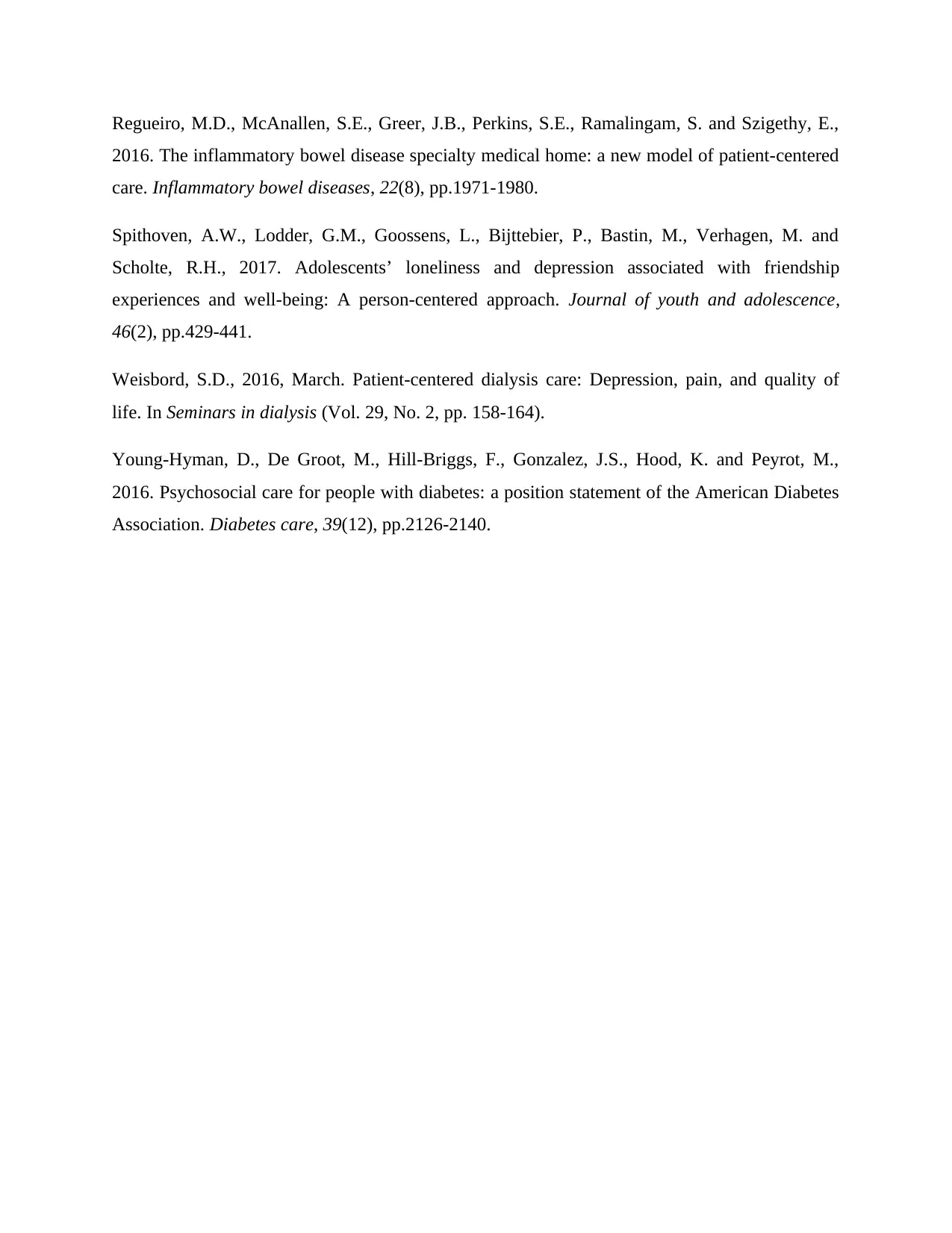
Regueiro, M.D., McAnallen, S.E., Greer, J.B., Perkins, S.E., Ramalingam, S. and Szigethy, E.,
2016. The inflammatory bowel disease specialty medical home: a new model of patient-centered
care. Inflammatory bowel diseases, 22(8), pp.1971-1980.
Spithoven, A.W., Lodder, G.M., Goossens, L., Bijttebier, P., Bastin, M., Verhagen, M. and
Scholte, R.H., 2017. Adolescents’ loneliness and depression associated with friendship
experiences and well-being: A person-centered approach. Journal of youth and adolescence,
46(2), pp.429-441.
Weisbord, S.D., 2016, March. Patient‐centered dialysis care: Depression, pain, and quality of
life. In Seminars in dialysis (Vol. 29, No. 2, pp. 158-164).
Young-Hyman, D., De Groot, M., Hill-Briggs, F., Gonzalez, J.S., Hood, K. and Peyrot, M.,
2016. Psychosocial care for people with diabetes: a position statement of the American Diabetes
Association. Diabetes care, 39(12), pp.2126-2140.
2016. The inflammatory bowel disease specialty medical home: a new model of patient-centered
care. Inflammatory bowel diseases, 22(8), pp.1971-1980.
Spithoven, A.W., Lodder, G.M., Goossens, L., Bijttebier, P., Bastin, M., Verhagen, M. and
Scholte, R.H., 2017. Adolescents’ loneliness and depression associated with friendship
experiences and well-being: A person-centered approach. Journal of youth and adolescence,
46(2), pp.429-441.
Weisbord, S.D., 2016, March. Patient‐centered dialysis care: Depression, pain, and quality of
life. In Seminars in dialysis (Vol. 29, No. 2, pp. 158-164).
Young-Hyman, D., De Groot, M., Hill-Briggs, F., Gonzalez, J.S., Hood, K. and Peyrot, M.,
2016. Psychosocial care for people with diabetes: a position statement of the American Diabetes
Association. Diabetes care, 39(12), pp.2126-2140.
1 out of 8
Related Documents
Your All-in-One AI-Powered Toolkit for Academic Success.
+13062052269
info@desklib.com
Available 24*7 on WhatsApp / Email
![[object Object]](/_next/static/media/star-bottom.7253800d.svg)
Unlock your academic potential
Copyright © 2020–2026 A2Z Services. All Rights Reserved. Developed and managed by ZUCOL.





